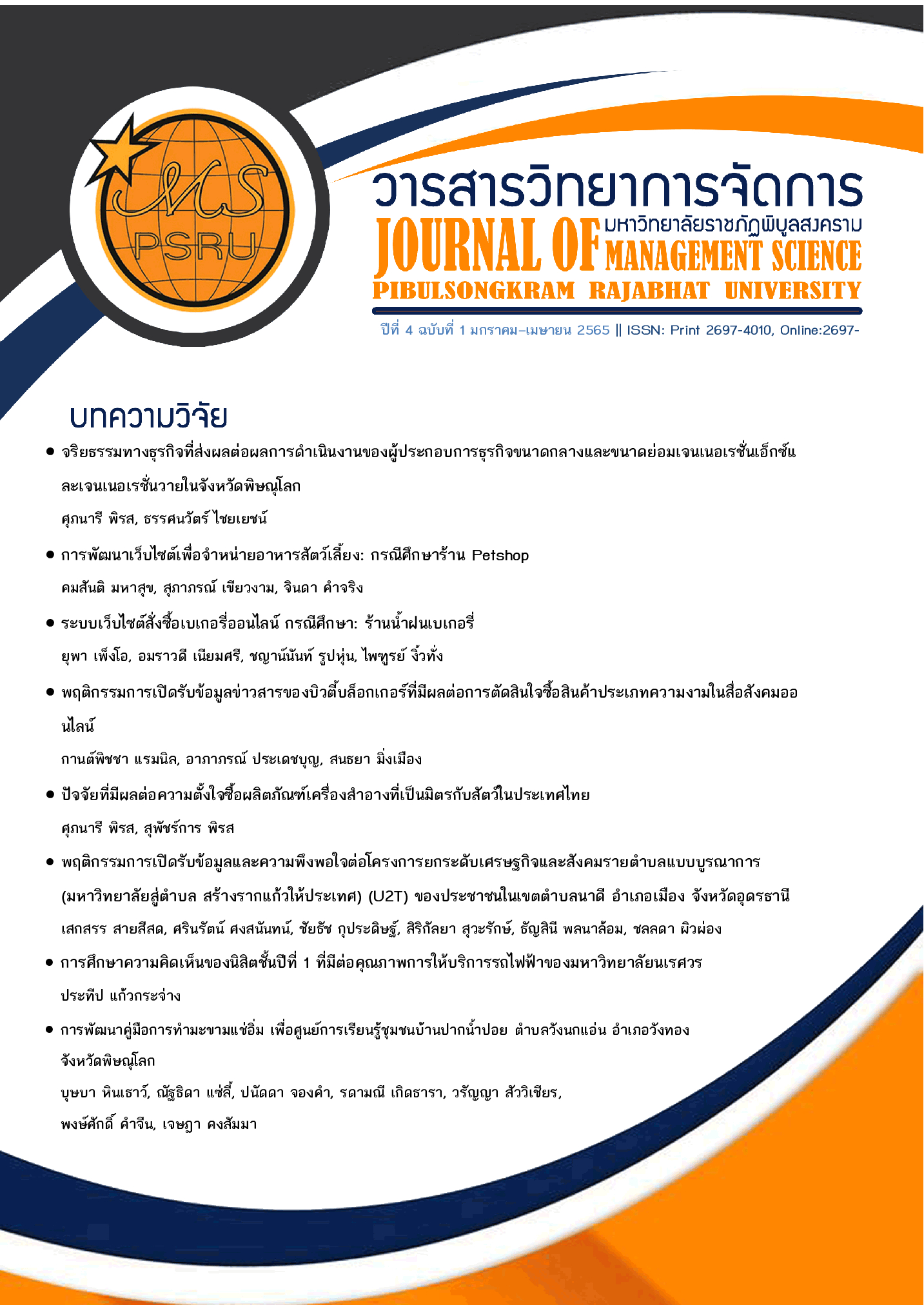จริยธรรมทางธุรกิจที่ส่งผลต่อผลการดำเนินงานของผู้ประกอบการธุรกิจขนาดกลางและขนาดย่อมเจนเนอเรชั่นเอ็กซ์และเจนเนอเรชั่นวายในจังหวัดพิษณุโลก
คำสำคัญ:
จริยธรรมทางธุรกิจ, ผลการดำเนินงาน, ผู้ประกอบการธุรกิจขนาดกลางและขนาดย่อม, ธุรกิจขนาดกลางและขนาดย่อม, เจนเนอเรชั่นเอ็กซ์ , เจนเนอเรชั่นวายบทคัดย่อ
ภายใต้สถานการณ์ทางธุรกิจที่มีความไม่แน่นอนในปัจจุบันส่งผลทำให้เกิดความก้าวหน้าทางด้านเทคโนโลยี และการเปลี่ยนแปลงทางสังคมซึ่งส่งผลกระทบต่อการเติบโตของธุรกิจต่างๆ การประกอบธุรกิจบนพื้นฐานของการมีจริยธรรมทางธุรกิจ ถือเป็นบทบาทสำคัญที่ช่วยสร้างความเชื่อมั่นและความจงรักภักดีต่อลูกค้า ซึ่งส่งผลต่อความยั่งยืนและอยู่รอดของธุรกิจได้ การวิจัยนี้มีวัตถุประสงค์ คือ 1) เพื่อศึกษาและเปรียบเทียบจริยธรรมทางธุรกิจของผู้ประกอบการธุรกิจขนาดกลางและขนาดย่อมเจนเนอเรชั่นเอ็กซ์และเจนเนอเรชั่นวายในจังหวัดพิษณุโลก 2) เพื่อศึกษาอิทธิพลของจริยธรรมทางธุรกิจที่มีผลต่อผลการดำเนินงานของผู้ประกอบการธุรกิจขนาดกลางและขนาดย่อมเจนเนอเรชั่นเอ็กซ์และเจนเนอเรชั่นวายในจังหวัดพิษณุโลก ซึ่งงานวิจัยนี้ใช้กลุ่มตัวอย่างคือ ผู้ประกอบการธุรกิจขนาดกลางและขนาดย่อมเจนเนอเรชั่นเอ็กซ์และเจนเนอเรชั่นวายในจังหวัดพิษณุโลก จำนวนทั้งสิ้น 261 คน โดยทำการสุ่มแบบเจาะจง เครื่องมือที่ใช้ในการวิจัยเป็นแบบสอบถาม 5-Likert Scales สถิติที่ใช้ในการวิเคราะห์ข้อมูล ได้แก่ ค่าร้อยละ ค่าเฉลี่ย ค่าส่วนเบี่ยงเบนมาตรฐาน การวิเคราะห์ถดถอยเชิงพหุคูณ (Multiple Regression Analysis) ผลการวิจัย พบว่า ผู้ประกอบการธุรกิจธนาดกลางและขนาดย่อมเจนเนอเรชั่นเอ็กซ์และเจนเนอเรชั่นวายมีจริยธรรมทางธุรกิจที่ไม่แตกต่างกัน รวมถึงจริยธรรมทางธุรกิจมีอิทธิพลในเชิงบวกต่อผลการดำเนินงาน โดยจำแนกองค์ประกอบของจริยธรรมทางธุรกิจในรายด้าน ผลการศึกษา ดังนี้ ด้านความซื่อสัตย์ (= 0.314, p < 0.01) และด้านการสร้างความน่าเชื่อถือ (
= 0.191, p < 0.01) มีอิทธิพลในเชิงบวกต่อผลการดำเนินงาน ดังนั้น ผู้ประกอบการธุรกิจควรให้ความสำคัญต่อกระบวนการในการประกอบธุรกิจที่มีความตรงไปตรงมา และดำเนินการบนพื้นฐานที่สังคมยอมรับ เพื่อทำให้เกิดภาพลักษณ์ที่ดีและความน่าเชื่อถือ จึงทำให้ธุรกิจประสบความสำเร็จมากยิ่งขึ้น
เอกสารอ้างอิง
ณัฎฐนันท์ ทรัพย์อินทร์. (2556). ความสัมพันธ์ระหว่างจริยธรรมในองค์กรและความผูกพันต่อองค์กรของพนักงานในกระทรวงอุตสาหกรรม เขตกรุงเทพมหานคร (การค้นคว้าอิสระปริญญาบริหารธุรกิจมหาบัณฑิต). ปทุมธานี : มหาวิทยาลัยเทคโนโลยีราชมงคลธัญบุรี.
ธนาคารแห่งประเทศไทย. (2564). ครอบคลุม ตรงจุด และทันการณ์ : รวมมาตรการช่วยเหลือธุรกิจในช่วง โควิด 19. สืบค้น 30
พฤศจิกายน 2564, จาก https://www.bot.or.th/Thai/BOTMagazine/Pages/256403TheKnowledge_Measures.aspx
สมประวิณ มันประเสริฐ. (2564). ผลกระทบโควิด 19 ต่อเศรษฐกิจไทยและผู้ประกอบการ SME. สืบค้น
พฤศจิกายน 2564, จาก https://www.krungsri.com/th/plearn-plearn/covid19-newnormal-with-sme
Aaker, D.A., Kumar, V. & Day, G.S. (2001). Marketing Research. New York: John Wiley and Sons.
Albu, R., Mandru, L. & Suciu, T. (2017). Impact of Ethics Upon Business Success. In Conference of ISI 30 th International Business Information Management Association Conference (pp.203-211). Spain: Madrid
Baucus, M.S. & Cochran, P.L. (2009). An Review of Empirical Research on Ethics in Entrepreneurial Firms within the United States. African Journal of Business Ethics, 4(2), 56-68.
Beck, T., Demirguc-Kunt, A., & Levine, R. (2005). SMEs, Growth, and Poverty: Cross-country Evidence. Journal of Economic Growth, 10(3), 199-229.
Certo, Samuel C. (2000). Modern Management. (8th ed). New Jersey: Prentice-Hall. Inc.
Dabor, A.O., Isiavwe, D.T., Ajagbe, M.A. & Oke, O.A. (2015). Impact of Corporate Governance on Firm Performance in Nigeria. International Journal of Economics, Commerce and Management, 3(6), 634-653.
Chatzopoulou, E. & Kiewiet, A. (2020). Millennials’ Evaluation of Corporate Social Responsibility: The Wants and Needs of the Largest and Most Ethical Generation. Journal of Consumer Behaviour, 20(3), 521-534.
Dunham, L., McVea, J.F., & Freeman, R.E. (2008). Entrepreneurial Wisdom: Incorporating the Ethical and Strategic Dimensions of Entrepreneurial Decision-making. International Journal of Entrepreneurship and Small Business, 6(1), 8–19.
Enofe, A.O., Ogbeide, O.L. & Julius, O.M. (2015). Business Ethics and Corporate Growth. European Journal of Business and Management, 7(15), 139-148.
Hair, Joseph F., Jr., Black, William C., Babin, Barry J., & Anderson, Rolph E. (2010). Multivariate Data Analysis A Global Perspective, (7th ed). New Jersey: Person Education, Inc.
Han, Y. & Hong, S. (2019). The Impact of Accountability on Organizational Performance in the U.S. Federal Government: the Moderating Role of Autonomy. Review of Public Personnel Administration, 39(1), 3-23.
Jamal, A.A. (2018). The Role of Business Ethics in Improving the Quality of Job Performance. Journal of Entrepreneurship and Organization Management, 7(1), 1-4.
Kaplan, R.S. & Norton, D. (1992). The Balanced Scorecard: Measures that Drive Performance. Harvard Business Reviews, 36(1), 21-79.
Lawrence, P.R. & Lorsch, J.W. (1967). Organization and Environment: Managing Differentiation and Integration. Boston, Massachusetts: Harvard University.
McMurrian & Matulich (2006). Building Customer Value and Profitability with Business Ethics. Journal of Business and Economics Research, 4(11), 11-18.
Mongkolkachit, Pisut (2016). The Impact of Corporate Social Responsibility on Firm Performance: Empirical Study of Thai Public Listed Companies. International (Humanities, Social Science and Arts), 9(5), 24-36.
Motilewa, B.D., Ogbari, M. & Aka, D. (2015). A Review of the Impacts SMEs as Social Agents of Economic Liberations in Developing Economies. International Review of Management and Business Research, 4(3), 903-914.
Musa, A.O. (2008), Perceived Role of Ethics and Social Responsibility in the Insurance Industry: Views from Developing Country. Journal of Knowledge Globalization, 1(2), 41-59.
Neville, B. (2005). A Contingent Resource-Based View of the Corporate Social Performance and Financial Performance Relationship: The Effect of Institutional Pressures. ANZMAC 2005 Conference: Corporate Responsibility, 61-67.
Nuseir, M.T. & Ghandour, A. (2019). Ethical Issues in Modern Business Management. International Journal Procurement Management, 12(5), 592-605.
Ogbari, M.E., Oke, A.O., Ibukunoluwa, A.A., Ajagbe, M.A. & Ologbo, A.C. (2016). Entrepreneurship and Business Ethics: Implications on Corporate Performance. International Journal of Economics and Financial Issues, 6(3), 50-58.
Pynes, J. E. (2009). Human Resource Management for Public and Nonprofit Organizations (3rd ed.). San Francisco, CA: John Wiley and Sons.
Saileela, K. & Thiruchanuru, S. (2017). Capturing the Nature of Generations at Workplace. International Journal of Advance Research and Development, 2(11), 95-106.
Sexty, R. (2011). Canadian Business and Society: Ethics and Responsibilities. Toronto. McGraw-Hill Ryerson.
Suparjo., Yohana, C. & Akbar, M. (2020). The Effect of Integrity, Professionalism, and Innovation on Service Performance. Journal of Business and Behavioural Entrepreneurship, 4(1), 26-42.
Turyakira, P.K. (2018). Ethical Practices of Small and Medium-Sized Enterprises in Developing Countries: Literature Analysis. South African Journal of Economic and Management Sciences, 21(1), 1-7.
Ugoani, J.N.N. (2019). Business Ethics and its Effect on Organizational Sustainability. Global Journal of Social Sciences Studies, 5(2), 119-131.
Zabel, K.L., Biermeier-Hanson, B.J., Baltes, B.B., Early, B.J. & Shepard, A. (2017). Generational Differences in Work Ethic: Fact or Fiction?. Journal of Business and Psychology, 32(3), 1-16.
ดาวน์โหลด
เผยแพร่แล้ว
รูปแบบการอ้างอิง
ฉบับ
ประเภทบทความ
สัญญาอนุญาต
ลิขสิทธิ์ (c) 2022 มหาวิทยาลัยราชภัฎพิบูลสงคราม

อนุญาตภายใต้เงื่อนไข Creative Commons Attribution-NonCommercial-NoDerivatives 4.0 International License.
บทความที่ได้รับการตีพิมพ์ในวารสารวิทยาการจัดการมหาวิทยาลัยราชภัฏพิบูลสงคราม เป็นลิขสิทธิ์ของ คณะวิทยาการจัดการ มหาวิทยาลัยราชภัฎพิบูลสงคราม บทความที่ลงพิมพ์ใน วารสารวิทยาการจัดการมหาวิทยาลัยราชภัฎพิบูลสงคราม ถือว่าเป็นความเห็นส่วนตัวของผู้เขียน คณะบรรณาธิการไม่จำเป็นต้องเห็นด้วย ผู้เขียนต้องรับผิดชอบต่อบทความของตนเอง



